|
|
|
Sort Order |
|
|
|
Items / Page
|
|
|
|
|
|
|
| Srl | Item |
| 1 |
ID:
120176
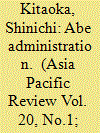

|
|
|
|
|
| Publication |
2013.
|
| Summary/Abstract |
The second Abe administration, inaugurated on December 26, 2012, has been called a repudiation of the Democratic Party of Japan (DPJ) rather than a strong endorsement of the Liberal Democratic Party (LDP). However, in the intervening months, public support has risen. Going forward, the Abe administration faces three serious challenges, namely the economy, security and foreign policy, and a strategy to win in the Upper House elections expected in July 2013. This article analyzes each of these challenges and explores possible courses that the administration could take.
|
|
|
|
|
|
|
|
|
|
|
|
|
|
|
|
| 2 |
ID:
117078
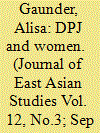

|
|
|
|
|
| Publication |
2012.
|
| Summary/Abstract |
The Democratic Party of Japan (DPJ) saw forty of its forty-six female candidates elected in the 2009 lower house election; twenty-six were first-time candidates. Recently, both the Liberal Democratic Party (LDP) and the DPJ have supported more women as "change" candidates in response to changing electoral incentives that favor broad appeals. The DPJ's victory, however, has not had a large impact on women in terms of governance or policy. An exploration of child allowance, day care provision, and dual surname legislation under the DPJ reveals that low seniority and the lack of a critical mass have prevented DPJ women from overcoming significant veto points. The electoral incentives of the emerging two-party system have resulted in a larger number of women in office, but the volatility of the system has sustained a weak voice for women in policymaking.
|
|
|
|
|
|
|
|
|
|
|
|
|
|
|
|
| 3 |
ID:
117075
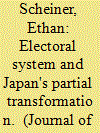

|
|
|
|
|
| Publication |
2012.
|
| Summary/Abstract |
Japan's electoral system, which emphasizes first-past-the-post, single-member district rules, has led the country's party system to become consolidated around the Liberal Democratic Party (LDP) and Democratic Party of Japan (DPJ). At the same time, Japan's electoral rules also made it likely that the two parties would not differ markedly in their policy positions, as well as hinder the emergence of new partisan alignments that could offer more clearly distinct policy options. Put differently, Japan's electoral rules have encouraged the development of what is essentially a two-party system, but one in which party alternation in power need not produce sharp policy change.
|
|
|
|
|
|
|
|
|
|
|
|
|
|
|
|
| 4 |
ID:
117073
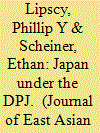

|
|
|
|
|
| Publication |
2012.
|
| Summary/Abstract |
In 2009, the Democratic Party of Japan (DPJ) brought an end to the long reign of the Liberal Democratic Party (LDP). However, despite high expectations, this politically transformative event has not unleashed significant policy change in Japan. We highlight five electoral factors that have acted as important constraints on policy change under DPJ rule. First, majoritarian electoral rules have led to a convergence in the policy positions of the two major political parties. Second, as the parties' policy positions have become more similar, voters have increasingly cast ballots based on "valence" (i.e., nonpolicy) evaluations. Third, large national vote swings have limited the tenure of young, inexperienced candidates who might otherwise serve as the instigators of reform. Fourth, Japan's electoral rules permit inconsistency across policy positions within parties and discourage greater policy coherence. Fifth, the continuing influence of rural regions has limited the scope of policy reform under the DPJ.
|
|
|
|
|
|
|
|
|
|
|
|
|
|
|
|
| 5 |
ID:
113616
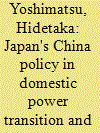

|
|
|
|
|
| Publication |
2012.
|
| Summary/Abstract |
The main objectives of this article are to examine the evolution of Japan's China policy in a power shift to the Democratic Party of Japan (DPJ) and to provide theoretical explanations for the evolution. The DPJ government showed accommodating postures toward China, and such postures derived from the DPJ leaders' particular preferences and perceptions as well as the party's aspiration for legitimating its power formation against the previous government. At the same time, political and security linkages with Washington constituted the baseline for Japan's evolving diplomatic intercourses with China. Neoclassical realism, which integrates domestic political factors with systemic political configurations, can provide valuable insights for explaining major aspects in the evolution of Japan's China policy.
|
|
|
|
|
|
|
|
|
|
|
|
|
|
|
|
| 6 |
ID:
116290
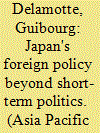

|
|
|
|
|
| Publication |
2012.
|
| Summary/Abstract |
In August 2009, the Liberal-Democratic Party (LDP), which had been in power since 1955, lost the general elections to a recently-formed party, the Democratic Party of Japan (DPJ). The LDP's foreign policy had placed emphasis on relations with the US, and on international cooperation and relations with Asia. The LDP's foreign and defense policy lacked a long term vision; it was incremental, pragmatic and could be described as reactive or passive. An examination of the DPJ's foreign policy, three years after its coming to power, reveals that it has accepted part of the LDP's inheritance. The Japan-US Alliance was reasserted as pivotal to Japan's security. Cooperation with Asia has not given birth to a new regional structure or to new institutional mechanisms, and dialogue with China has not improved; incrementalism is still preferred in the field of defense. Nonetheless, the fact that Japan's opposition is now a catch-all party at the center of the political scene changes the framework of foreign and defense policy-making considerably. Therefore, the likelihood of interpartite cooperation over foreign and security policy is theoretically conceivable. Nonetheless, political and institutional constraints to change in the field remain.
|
|
|
|
|
|
|
|
|
|
|
|
|
|
|
|
|
|
|
|
|